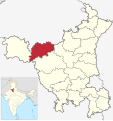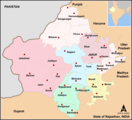‹ The template Infobox language is being considered for merging. ›
| Bagri | |
|---|---|
| बागड़ी | |
 The word "Bagri" written in Devanagari script The word "Bagri" written in Devanagari script | |
| Native to | India |
| Region | Bagar |
| Ethnicity | Bagris |
| Native speakers | 8,556,652 (2011 census) |
| Language family | Indo-European
|
| Writing system | Devanagari, Gurmukhi |
| Official status | |
| Recognised minority language in | Haryana, Punjab, Rajasthan |
| Language codes | |
| ISO 639-3 | bgq |
| Glottolog | bagr1243 |
| MapBagar Region | |
The Bagri is a dialect bridge of Rajasthani, Haryanvi & Punjabi and takes its name from the Bagar tract region of Northwestern India in the states of Rajasthan, Punjab and Haryana. The language has a very high (70%) lexical similarity with Haryanvi. Bagri is a typical Indo-Aryan language akin to Haryanvi, Punjabi and Rajasthani with SOV word order. The most striking phonological feature of Bagri is the presence of three lexical tones: high, mid, and low, akin to Rajasthani, Haryanvi, Punjabi.
The speakers are mostly in India, with a minority of them in Bahawalpur and Bahwalnagar areas in modern day Pakistan. According to the 2011 census of India, there are 234,227 speakers of Rajasthani Bagri and 1,656,588 speakers of Punjabi Bagri.
Geographical distribution
| States | Districts and tehsils |
|---|---|
| Rajasthan |
|
| Punjab |
|
| Haryana |
|
Features
Phonology
Bagri distinguishes 31 consonants including a retroflex series, 10 vowels, 2 diphthongs, and 3 tones.
| Labial | Dental | Retroflex | Palatal | Velar | Glottal | ||
|---|---|---|---|---|---|---|---|
| plosive | Voiceless | p | t | ʈ ⟨ṭ⟩ | c | k | |
| Aspirated | pʰ | tʰ | ʈʰ ⟨ṭh⟩ | cʰ | kʰ | ||
| Voiced | b | d | ɖ ⟨ḍ⟩ | ɟ ⟨j⟩ | g | ||
| Breathy | bʰ | dʰ | ɖʰ ⟨ḍh⟩ | ɟʰ ⟨jh⟩ | gʰ | ||
| fricative | s | h | |||||
| sonorant | Nasal | m | n | ɳ ⟨ṇ⟩ | |||
| Approximant | l | ɭ ⟨ḷ⟩ | j ⟨y⟩ | w | |||
| Flap | ɽ ⟨ṛ⟩ | ||||||
| Trill | r | ||||||
/ɳ/, /ɭ/ and /ɽ/ do not occur word initially.
| Front | Central | Back | |
|---|---|---|---|
| Close | iː ⟨ī⟩ | uː ⟨ū⟩ | |
| Near-close | ɪ ⟨i⟩ | ʊ ⟨u⟩ | |
| Close-mid | eː ⟨e⟩ | ə ⟨a⟩ | oː ⟨o⟩ |
| Open-mid | ɛː ⟨ai⟩ | ɔː ⟨au⟩ | |
| Open | aː ⟨ā⟩ |
All vowels have their nasalised counterpart, marked with ◌̃ (ँ in Devanagari).
Bagri has 3 tones in a similar way to the Punjabi language. A rising-falling tone ◌́, a rising tone ◌̀, and an unmarked mid tone.
Declension
- There are two numbers: singular and plural.
- Two genders: masculine and feminine.
- Three cases: simple, oblique, and vocative. Case marking is partly inflectional and partly postpositional.
- Nouns are declined according to their final segments.
- All pronouns are inflected for number and case but gender is distinguished only in the third person singular pronouns.
- The third person pronouns are distinguished on the proximity/remoteness dimension in each gender.
- Adjectives are of two types: either ending in /-o/ or not.
- Cardinal numbers up to ten are infected.
- Both present and past participles function as adjectives.
Verbs
- There are three tenses and four moods.
Syntax
- Sentence types are of traditional nature.
- Coordination and subordination are very important in complex sentences.
- Parallel lexicon are existing and are very important from sociolinguistic point of view.
Samples
रोळो
rollo
है
ha
के
ke
कोई
koī
तेरै
terai
रोळो है के कोई तेरै
rollo ha ke koī terai
Do you have any problem?
तू
too
कठै
kithe
गयैड़ो
gayairo
हो
a
तू कठै गयैड़ो हो
too kithe gayairo a
Where did you go?
bhanda
bhanda
Utensils
घोड़ो
Ghodo
होव
hov
जिओं
jiya
घोड़ो होव जिओं
Ghodo hov jiya
Like a horse
कोजवाड़
kojwād
कोजवाड़
kojwād
Embarrassing.
ब्या
viahh
मे
ch
कुण
kon
आयो
pa
ब्या मे कुण आयो
viahh ch kon pa
Who came in the marriage?
टाबरो
tabaro
के
ke
करो
karo
हो
ho
टाबरो के करो हो
tabaro ke karo ho
What are you doing kids?
टाबरो
tabaro
के
ke
करो
karo
हो
ho
टाबरो के करो हो
tabaro ke karo ho
What are you doing kids?
Kutta
Kutta
Dog
Official status
There are two varieties of Bagri, Bagri Rajasthani and Bagri Punjabi. During the census, Bagri Rajasthani, spoken in Haryana and Rajasthan, is considered a Hindi dialect while Bagri Punjabi, spoken in Punjab, is considered a Punjabi dialect.
Work on Bagri
- Grierson, G. A. 1908. (Reprint 1968). Linguistic Survey of India. Volume IX, Part II. New Delhi: Motilal Banarasidass
- Gusain, Lakhan. 1994. Reflexives in Bagri. M.Phil. dissertation. New Delhi: Jawaharlal Nehru University
- Gusain, Lakhan. 1999. A Descriptive Grammar of Bagri. Ph.D. dissertation. New Delhi: Jawaharlal Nehru University
- Gusain, Lakhan. 2000a. Limitations of Literacy in Bagri. Nicholas Ostler & Blair Rudes (eds.). Endangered Languages and Literacy. Proceedings of the Fourth FEL Conference. University of North Carolina, Charlotte, 21–24 September 2000
- Gusain, Lakhan. 2000b. Bagri Grammar. Munich: Lincom Europa (Languages of the World/Materials, 384)
- Gusain, Lakhan. 2008. Bagri Learners' Reference Grammar. Ann Arbor, Michigan: Northside Publishers
- Wilson, J. 1883. Sirsa Settlement Report. Chandigarh: Government Press
Gallery
Regions where Bagri is spoken:
-
 Bagri is the First language in Sirsa district.
Bagri is the First language in Sirsa district.
-
 Bagri is the First language in western Fatehabad district Hisar, Bhiwani, Charkhi dadri.
Bagri is the First language in western Fatehabad district Hisar, Bhiwani, Charkhi dadri.
-
 Bagri is the First language of Ganganagar district, Hanumangarh district, north-western part of Churu district and a major language in north-western part of Jhunjhunu district in Rajasthan.
Bagri is the First language of Ganganagar district, Hanumangarh district, north-western part of Churu district and a major language in north-western part of Jhunjhunu district in Rajasthan.
-
 Bagri is the major language in Fazilka district and as a minor language in southern villages of Muktsar district of Southern Punjab (India).
Bagri is the major language in Fazilka district and as a minor language in southern villages of Muktsar district of Southern Punjab (India).
See also
- Rajasthani language
- List of winners of Sahitya Akademi Awards for writing in Rajasthani language
- List of Rajasthani poets
- List of Indian poets#Rajasthani
References
- "Statement 1: Abstract of speakers' strength of languages and mother tongues - 2011". www.censusindia.gov.in. Office of the Registrar General & Census Commissioner, India. Retrieved 7 July 2018.
- https://dspace.gipe.ac.in/xmlui/bitstream/handle/10973/18895/GIPE-070453.pdf?sequence=3&isAllowed=y%7CBagri is classified under Rajasthani language since census 1931 according to Government of India which is available in the provided official pdf
- "Revised Land and Revenue Settlement of Hisar District 9006-9011" (PDF). Archived from the original (PDF) on 17 May 2017. Retrieved 26 March 2016.
- Census of India 2011
- ^ Gusain, Lakhan: Reflexives in Bagri. Jawaharlal Nehru University, New Delhi, 1994
- ^ Gusain, Lakhan: Limitations of Literacy in Bagri. Nicholas Ostler & Blair Rudes (eds.). Endangered Languages and Literacy. Proceedings of the Fourth FEL Conference. University of North Carolina, Charlotte, 21–24 September 2000
- Census India 2001
- ^ "The map shows study area and the Eco-cultural regions of Haryana... | Download Scientific Diagram".
- ^ Gusain, Lakhan. A Descriptive Grammar of Bagri. pp. 165–198.
- "LANGUAGE - INDIA, STATES AND UNION TERRITORIES (Table C-16)" (PDF). Census of India 2011. Archived from the original (PDF) on 12 July 2018.
Bibliography
- Gusain, Lakhan (1999). A Descriptive Grammar of Bagri (PhD). Jawaharlal Nehru University. hdl:10603/16847.
- Gusain, Lakhan (2000). Bagri. Languages of the world. Materials. Munich: LINCOM Europa. ISBN 978-3-89586-398-1.
External links
| Indo-Aryan languages | |||||||||||||||||||||||||||
|---|---|---|---|---|---|---|---|---|---|---|---|---|---|---|---|---|---|---|---|---|---|---|---|---|---|---|---|
| Dardic |
| ||||||||||||||||||||||||||
| Northern |
| ||||||||||||||||||||||||||
| Northwestern |
| ||||||||||||||||||||||||||
| Western |
| ||||||||||||||||||||||||||
| Central |
| ||||||||||||||||||||||||||
| Eastern |
| ||||||||||||||||||||||||||
| Southern |
| ||||||||||||||||||||||||||
| Old | |||||||||||||||||||||||||||
| Middle |
| ||||||||||||||||||||||||||
| Proto- languages | |||||||||||||||||||||||||||
| Unclassified |
| ||||||||||||||||||||||||||
| Pidgins and creoles | |||||||||||||||||||||||||||
| Languages of India | |||||||||||
|---|---|---|---|---|---|---|---|---|---|---|---|
| Official languages |
| ||||||||||
| Major unofficial languages |
| ||||||||||